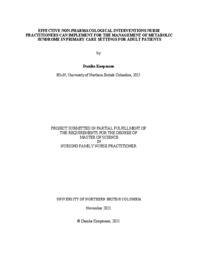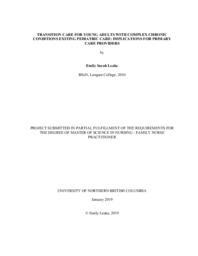Dunbar, Heidi
Person Preferred Name
Heidi Dunbar
Related Works
Content type
Digital Document
Description / Synopsis
Metabolic syndrome consists of a combination of abdominal obesity, dyslipidemia, hypertension, and elevated glucose levels. Metabolic syndrome is prevalent in North America with upwards of 20% of adults meeting criteria for the condition. It is associated with increased risk of morbidity and mortality, particularly cardiovascular disease, stroke, and renal failure. Its prevalence and widespread consequences have major implications for overall burden of disease and cost on the health care system. First-line treatments for management of metabolic syndrome and its associated individual components require a multifaceted approach including nonpharmacological therapy. This integrative review seeks to answer the question: “What are effective non-pharmacological interventions nurse practitioners can implement for the management of metabolic syndrome in primary care settings for adult patients?” The Whittemore and Knafl (2005) method was followed to ensure a thorough process to which the findings and conclusion are described. There are few guidelines offering effective means of implementing non-pharmacological management of this disease. This review assesses the literature and identifies 13 articles which address effective non-pharmacological interventions in the management of MetS. These interventions were grouped into four categories including, dietary interventions, exercise interventions, psychological support, and a combined intervention approach. The lengths of intervention varied from 3 months to 5 years. Providers responsible for delivery of the interventions varied and were not limited to nurse practitioners. The outcomes of significance included improved anthropometric and serological measures, as well as improved participant motivation and behaviour change. For optimal outcomes of patients, the management of metabolic syndrome in a primary care setting requires a multifaceted and patient-centred approach.
Origin Information
Content type
Digital Document
Description / Synopsis
Primary care providers (PCPs), including nurse practitioners and primary care physicians, experience significant occupational stress, putting them at risk for chronic stress and burnout. Burnout rates are high amongst PCPs, and results in negative health effects that can impact the personal life of the PCP, as well as professional outcomes and patient care. Mindfulness has been shown to reduce anxiety and burnout symptoms, and improve healthcare provider well-being. Using an integrative literature review methodology outlined by Whittemore and Knafl, this paper explores if a mindfulness practice can reduce stress and burnout symptoms for PCPs. The results are discussed within the context of a primary care setting in Canada. Relevant literature was searched and a selected sample of ten primary research articles was selected for further analysis. Results suggest that mindfulness interventions are effective for reducing stress and burnout symptoms for PCPs, but access to these interventions may be a barrier to successful implementation of a mindfulness practice. In a primary care setting in Canada, PCPs are encouraged to attend mindfulness interventions and incorporate learned components into their practice, thereby increasing patient-centered care. Recommendations for reducing stress and burnout symptoms for PCPs are discussed, and specific strategies for successful implementation of mindfulness interventions are provided.
Origin Information
Content type
Digital Document
Origin Information
Content type
Digital Document
Origin Information




